Ethical Clearance Application: Rewards System and Employee Performance
VerifiedAdded on 2023/01/05
|7
|2077
|90
Homework Assignment
AI Summary
This document presents a student's request for ethical approval for a research study focusing on the impact of reward systems on employee performance within the hospitality industry, specifically referencing Hilton. The study aims to understand the role of reward systems in enhancing employee performance and identifies specific objectives, including evaluating reward systems, understanding different types and their impact, and analyzing potential barriers. The research employs a qualitative approach, utilizing questionnaires for data collection from a sample of 50 recently retired employees, selected through simple random sampling. The ethical considerations addressed include consent, deception, debriefing, withdrawal, confidentiality, and data protection. The student outlines the study design, research methods (inductive approach, qualitative research), and the use of questionnaires as a research tool, along with a detailed description of the study sample and ethical considerations, ensuring participant rights and data security. The study does not involve payments or rewards to participants but meticulously addresses ethical implications, including data protection and confidentiality.
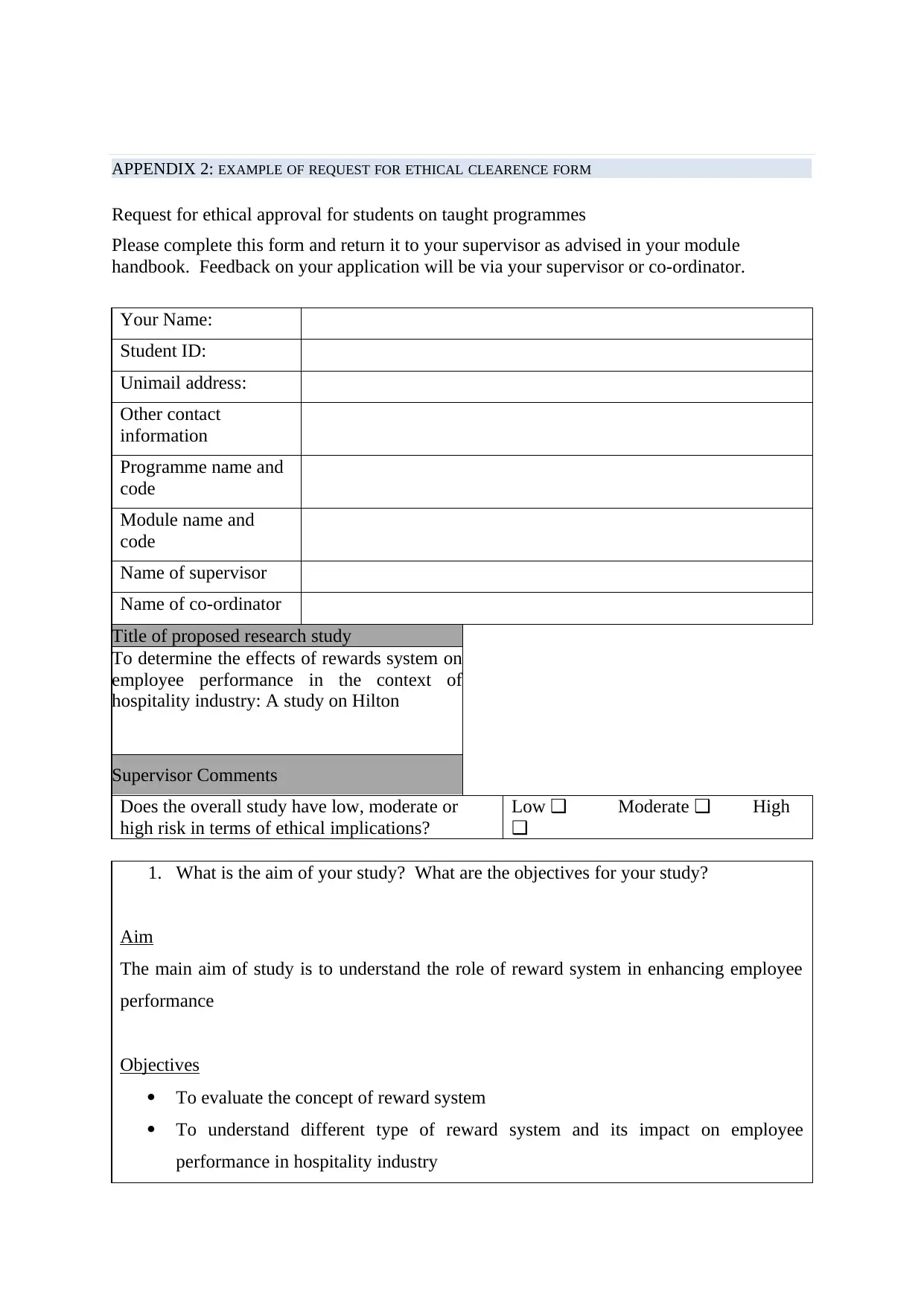
APPENDIX 2: EXAMPLE OF REQUEST FOR ETHICAL CLEARENCE FORM
Request for ethical approval for students on taught programmes
Please complete this form and return it to your supervisor as advised in your module
handbook. Feedback on your application will be via your supervisor or co-ordinator.
Your Name:
Student ID:
Unimail address:
Other contact
information
Programme name and
code
Module name and
code
Name of supervisor
Name of co-ordinator
Title of proposed research study
To determine the effects of rewards system on
employee performance in the context of
hospitality industry: A study on Hilton
Supervisor Comments
Does the overall study have low, moderate or
high risk in terms of ethical implications?
Low ❑ Moderate ❑ High
❑
1. What is the aim of your study? What are the objectives for your study?
Aim
The main aim of study is to understand the role of reward system in enhancing employee
performance
Objectives
To evaluate the concept of reward system
To understand different type of reward system and its impact on employee
performance in hospitality industry
Request for ethical approval for students on taught programmes
Please complete this form and return it to your supervisor as advised in your module
handbook. Feedback on your application will be via your supervisor or co-ordinator.
Your Name:
Student ID:
Unimail address:
Other contact
information
Programme name and
code
Module name and
code
Name of supervisor
Name of co-ordinator
Title of proposed research study
To determine the effects of rewards system on
employee performance in the context of
hospitality industry: A study on Hilton
Supervisor Comments
Does the overall study have low, moderate or
high risk in terms of ethical implications?
Low ❑ Moderate ❑ High
❑
1. What is the aim of your study? What are the objectives for your study?
Aim
The main aim of study is to understand the role of reward system in enhancing employee
performance
Objectives
To evaluate the concept of reward system
To understand different type of reward system and its impact on employee
performance in hospitality industry
Paraphrase This Document
Need a fresh take? Get an instant paraphrase of this document with our AI Paraphraser
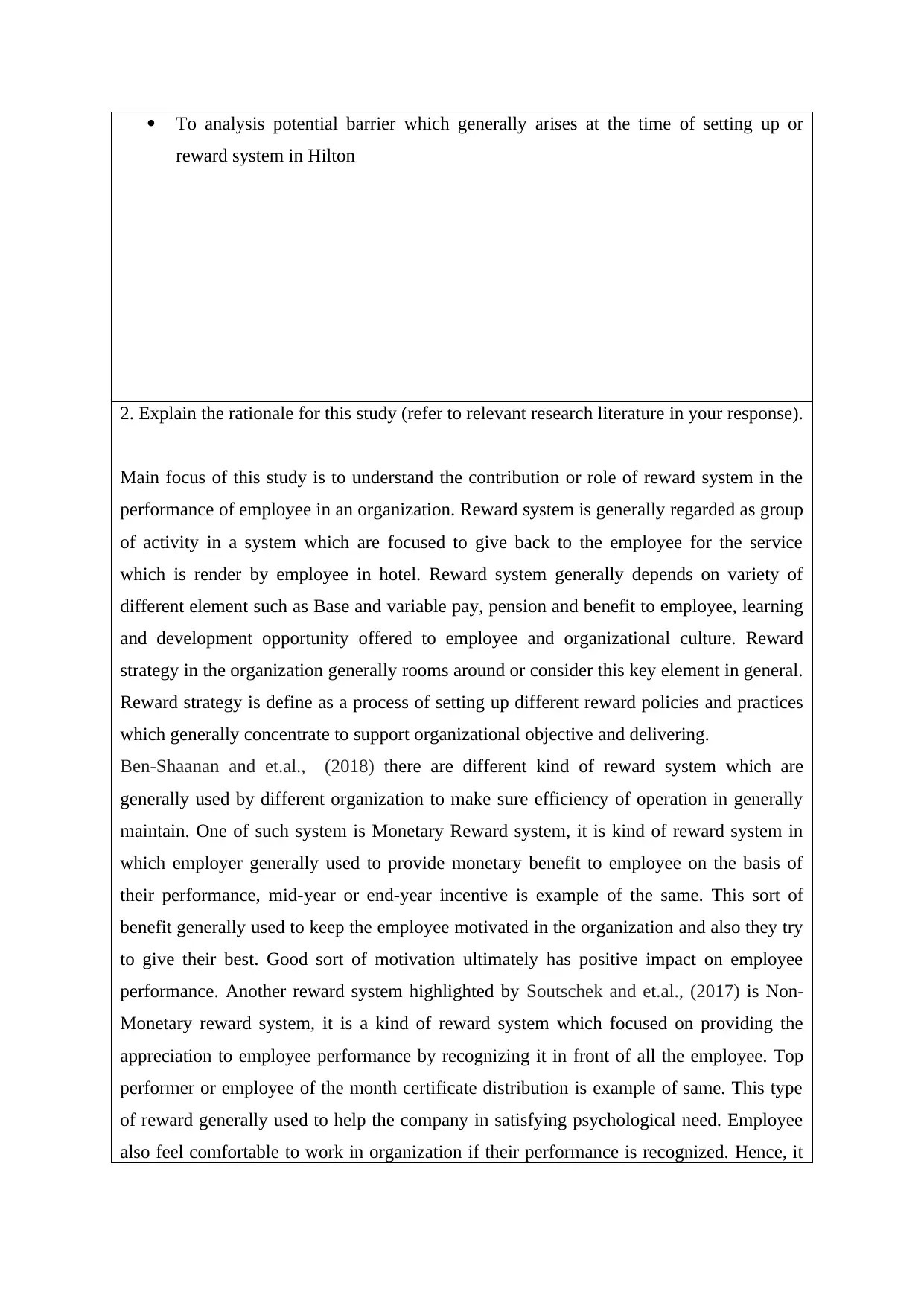
To analysis potential barrier which generally arises at the time of setting up or
reward system in Hilton
2. Explain the rationale for this study (refer to relevant research literature in your response).
Main focus of this study is to understand the contribution or role of reward system in the
performance of employee in an organization. Reward system is generally regarded as group
of activity in a system which are focused to give back to the employee for the service
which is render by employee in hotel. Reward system generally depends on variety of
different element such as Base and variable pay, pension and benefit to employee, learning
and development opportunity offered to employee and organizational culture. Reward
strategy in the organization generally rooms around or consider this key element in general.
Reward strategy is define as a process of setting up different reward policies and practices
which generally concentrate to support organizational objective and delivering.
Ben-Shaanan and et.al., (2018) there are different kind of reward system which are
generally used by different organization to make sure efficiency of operation in generally
maintain. One of such system is Monetary Reward system, it is kind of reward system in
which employer generally used to provide monetary benefit to employee on the basis of
their performance, mid-year or end-year incentive is example of the same. This sort of
benefit generally used to keep the employee motivated in the organization and also they try
to give their best. Good sort of motivation ultimately has positive impact on employee
performance. Another reward system highlighted by Soutschek and et.al., (2017) is Non-
Monetary reward system, it is a kind of reward system which focused on providing the
appreciation to employee performance by recognizing it in front of all the employee. Top
performer or employee of the month certificate distribution is example of same. This type
of reward generally used to help the company in satisfying psychological need. Employee
also feel comfortable to work in organization if their performance is recognized. Hence, it
reward system in Hilton
2. Explain the rationale for this study (refer to relevant research literature in your response).
Main focus of this study is to understand the contribution or role of reward system in the
performance of employee in an organization. Reward system is generally regarded as group
of activity in a system which are focused to give back to the employee for the service
which is render by employee in hotel. Reward system generally depends on variety of
different element such as Base and variable pay, pension and benefit to employee, learning
and development opportunity offered to employee and organizational culture. Reward
strategy in the organization generally rooms around or consider this key element in general.
Reward strategy is define as a process of setting up different reward policies and practices
which generally concentrate to support organizational objective and delivering.
Ben-Shaanan and et.al., (2018) there are different kind of reward system which are
generally used by different organization to make sure efficiency of operation in generally
maintain. One of such system is Monetary Reward system, it is kind of reward system in
which employer generally used to provide monetary benefit to employee on the basis of
their performance, mid-year or end-year incentive is example of the same. This sort of
benefit generally used to keep the employee motivated in the organization and also they try
to give their best. Good sort of motivation ultimately has positive impact on employee
performance. Another reward system highlighted by Soutschek and et.al., (2017) is Non-
Monetary reward system, it is a kind of reward system which focused on providing the
appreciation to employee performance by recognizing it in front of all the employee. Top
performer or employee of the month certificate distribution is example of same. This type
of reward generally used to help the company in satisfying psychological need. Employee
also feel comfortable to work in organization if their performance is recognized. Hence, it
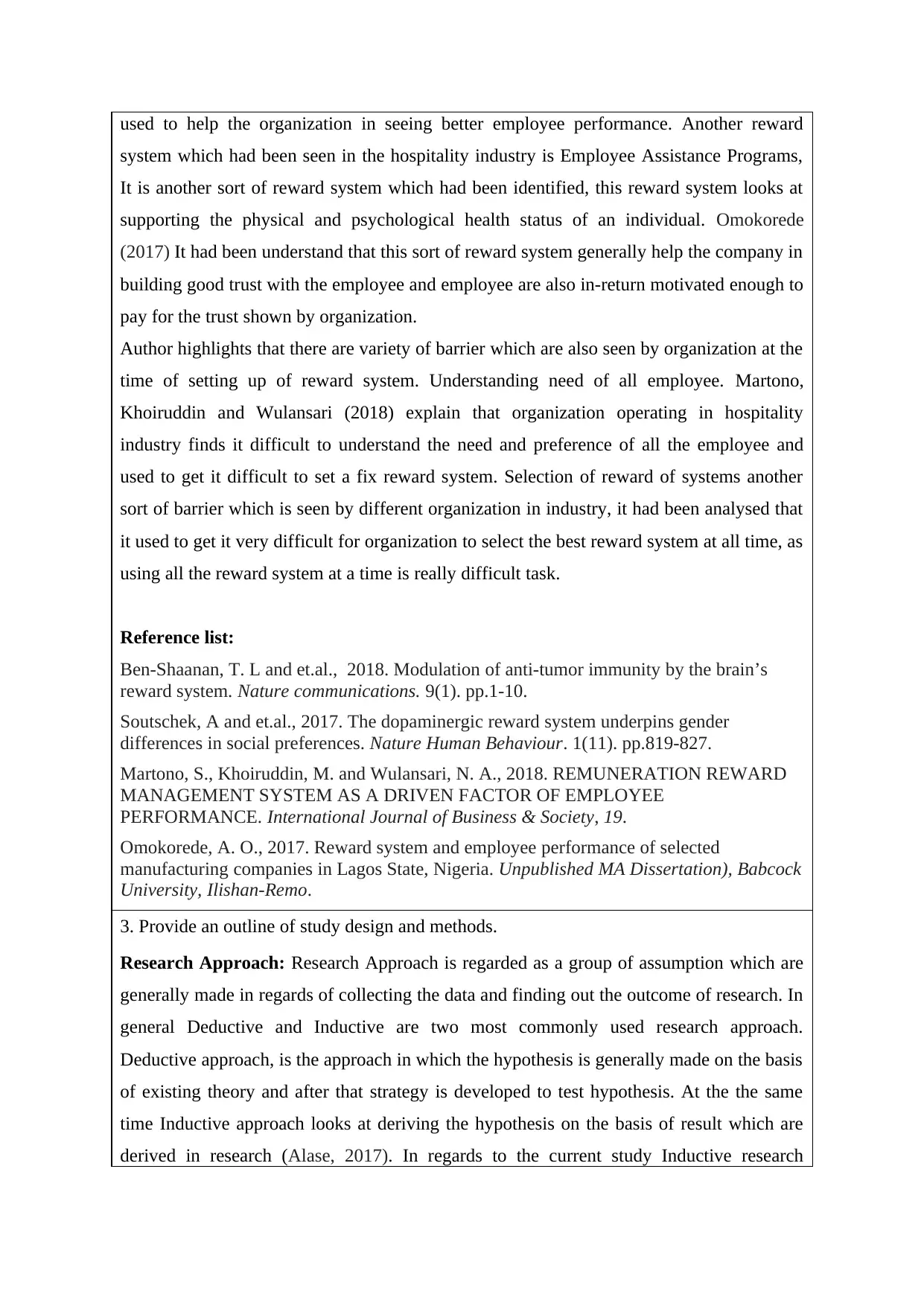
used to help the organization in seeing better employee performance. Another reward
system which had been seen in the hospitality industry is Employee Assistance Programs,
It is another sort of reward system which had been identified, this reward system looks at
supporting the physical and psychological health status of an individual. Omokorede
(2017) It had been understand that this sort of reward system generally help the company in
building good trust with the employee and employee are also in-return motivated enough to
pay for the trust shown by organization.
Author highlights that there are variety of barrier which are also seen by organization at the
time of setting up of reward system. Understanding need of all employee. Martono,
Khoiruddin and Wulansari (2018) explain that organization operating in hospitality
industry finds it difficult to understand the need and preference of all the employee and
used to get it difficult to set a fix reward system. Selection of reward of systems another
sort of barrier which is seen by different organization in industry, it had been analysed that
it used to get it very difficult for organization to select the best reward system at all time, as
using all the reward system at a time is really difficult task.
Reference list:
Ben-Shaanan, T. L and et.al., 2018. Modulation of anti-tumor immunity by the brain’s
reward system. Nature communications. 9(1). pp.1-10.
Soutschek, A and et.al., 2017. The dopaminergic reward system underpins gender
differences in social preferences. Nature Human Behaviour. 1(11). pp.819-827.
Martono, S., Khoiruddin, M. and Wulansari, N. A., 2018. REMUNERATION REWARD
MANAGEMENT SYSTEM AS A DRIVEN FACTOR OF EMPLOYEE
PERFORMANCE. International Journal of Business & Society, 19.
Omokorede, A. O., 2017. Reward system and employee performance of selected
manufacturing companies in Lagos State, Nigeria. Unpublished MA Dissertation), Babcock
University, Ilishan-Remo.
3. Provide an outline of study design and methods.
Research Approach: Research Approach is regarded as a group of assumption which are
generally made in regards of collecting the data and finding out the outcome of research. In
general Deductive and Inductive are two most commonly used research approach.
Deductive approach, is the approach in which the hypothesis is generally made on the basis
of existing theory and after that strategy is developed to test hypothesis. At the the same
time Inductive approach looks at deriving the hypothesis on the basis of result which are
derived in research (Alase, 2017). In regards to the current study Inductive research
system which had been seen in the hospitality industry is Employee Assistance Programs,
It is another sort of reward system which had been identified, this reward system looks at
supporting the physical and psychological health status of an individual. Omokorede
(2017) It had been understand that this sort of reward system generally help the company in
building good trust with the employee and employee are also in-return motivated enough to
pay for the trust shown by organization.
Author highlights that there are variety of barrier which are also seen by organization at the
time of setting up of reward system. Understanding need of all employee. Martono,
Khoiruddin and Wulansari (2018) explain that organization operating in hospitality
industry finds it difficult to understand the need and preference of all the employee and
used to get it difficult to set a fix reward system. Selection of reward of systems another
sort of barrier which is seen by different organization in industry, it had been analysed that
it used to get it very difficult for organization to select the best reward system at all time, as
using all the reward system at a time is really difficult task.
Reference list:
Ben-Shaanan, T. L and et.al., 2018. Modulation of anti-tumor immunity by the brain’s
reward system. Nature communications. 9(1). pp.1-10.
Soutschek, A and et.al., 2017. The dopaminergic reward system underpins gender
differences in social preferences. Nature Human Behaviour. 1(11). pp.819-827.
Martono, S., Khoiruddin, M. and Wulansari, N. A., 2018. REMUNERATION REWARD
MANAGEMENT SYSTEM AS A DRIVEN FACTOR OF EMPLOYEE
PERFORMANCE. International Journal of Business & Society, 19.
Omokorede, A. O., 2017. Reward system and employee performance of selected
manufacturing companies in Lagos State, Nigeria. Unpublished MA Dissertation), Babcock
University, Ilishan-Remo.
3. Provide an outline of study design and methods.
Research Approach: Research Approach is regarded as a group of assumption which are
generally made in regards of collecting the data and finding out the outcome of research. In
general Deductive and Inductive are two most commonly used research approach.
Deductive approach, is the approach in which the hypothesis is generally made on the basis
of existing theory and after that strategy is developed to test hypothesis. At the the same
time Inductive approach looks at deriving the hypothesis on the basis of result which are
derived in research (Alase, 2017). In regards to the current study Inductive research
⊘ This is a preview!⊘
Do you want full access?
Subscribe today to unlock all pages.

Trusted by 1+ million students worldwide
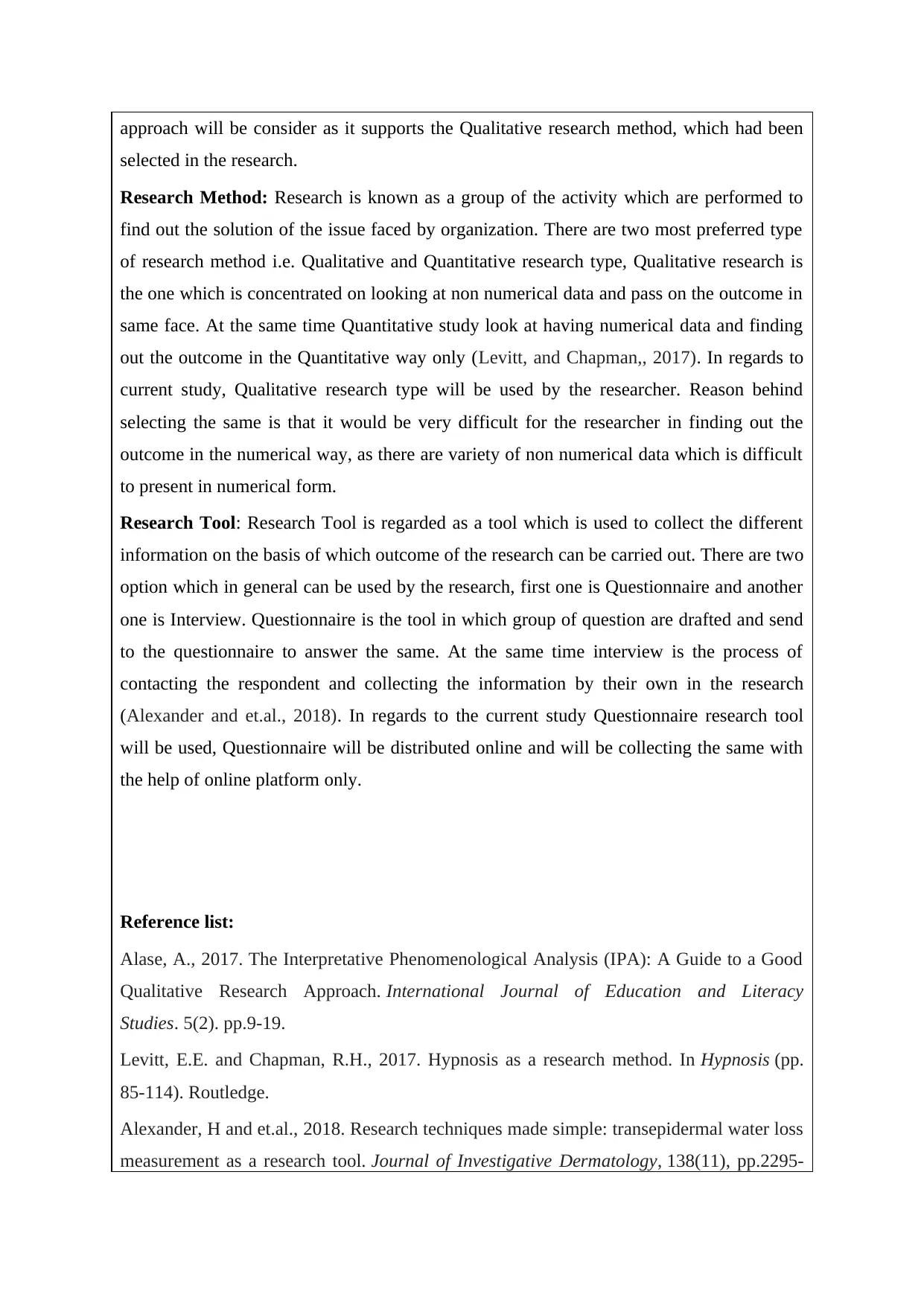
approach will be consider as it supports the Qualitative research method, which had been
selected in the research.
Research Method: Research is known as a group of the activity which are performed to
find out the solution of the issue faced by organization. There are two most preferred type
of research method i.e. Qualitative and Quantitative research type, Qualitative research is
the one which is concentrated on looking at non numerical data and pass on the outcome in
same face. At the same time Quantitative study look at having numerical data and finding
out the outcome in the Quantitative way only (Levitt, and Chapman,, 2017). In regards to
current study, Qualitative research type will be used by the researcher. Reason behind
selecting the same is that it would be very difficult for the researcher in finding out the
outcome in the numerical way, as there are variety of non numerical data which is difficult
to present in numerical form.
Research Tool: Research Tool is regarded as a tool which is used to collect the different
information on the basis of which outcome of the research can be carried out. There are two
option which in general can be used by the research, first one is Questionnaire and another
one is Interview. Questionnaire is the tool in which group of question are drafted and send
to the questionnaire to answer the same. At the same time interview is the process of
contacting the respondent and collecting the information by their own in the research
(Alexander and et.al., 2018). In regards to the current study Questionnaire research tool
will be used, Questionnaire will be distributed online and will be collecting the same with
the help of online platform only.
Reference list:
Alase, A., 2017. The Interpretative Phenomenological Analysis (IPA): A Guide to a Good
Qualitative Research Approach. International Journal of Education and Literacy
Studies. 5(2). pp.9-19.
Levitt, E.E. and Chapman, R.H., 2017. Hypnosis as a research method. In Hypnosis (pp.
85-114). Routledge.
Alexander, H and et.al., 2018. Research techniques made simple: transepidermal water loss
measurement as a research tool. Journal of Investigative Dermatology, 138(11), pp.2295-
selected in the research.
Research Method: Research is known as a group of the activity which are performed to
find out the solution of the issue faced by organization. There are two most preferred type
of research method i.e. Qualitative and Quantitative research type, Qualitative research is
the one which is concentrated on looking at non numerical data and pass on the outcome in
same face. At the same time Quantitative study look at having numerical data and finding
out the outcome in the Quantitative way only (Levitt, and Chapman,, 2017). In regards to
current study, Qualitative research type will be used by the researcher. Reason behind
selecting the same is that it would be very difficult for the researcher in finding out the
outcome in the numerical way, as there are variety of non numerical data which is difficult
to present in numerical form.
Research Tool: Research Tool is regarded as a tool which is used to collect the different
information on the basis of which outcome of the research can be carried out. There are two
option which in general can be used by the research, first one is Questionnaire and another
one is Interview. Questionnaire is the tool in which group of question are drafted and send
to the questionnaire to answer the same. At the same time interview is the process of
contacting the respondent and collecting the information by their own in the research
(Alexander and et.al., 2018). In regards to the current study Questionnaire research tool
will be used, Questionnaire will be distributed online and will be collecting the same with
the help of online platform only.
Reference list:
Alase, A., 2017. The Interpretative Phenomenological Analysis (IPA): A Guide to a Good
Qualitative Research Approach. International Journal of Education and Literacy
Studies. 5(2). pp.9-19.
Levitt, E.E. and Chapman, R.H., 2017. Hypnosis as a research method. In Hypnosis (pp.
85-114). Routledge.
Alexander, H and et.al., 2018. Research techniques made simple: transepidermal water loss
measurement as a research tool. Journal of Investigative Dermatology, 138(11), pp.2295-
Paraphrase This Document
Need a fresh take? Get an instant paraphrase of this document with our AI Paraphraser
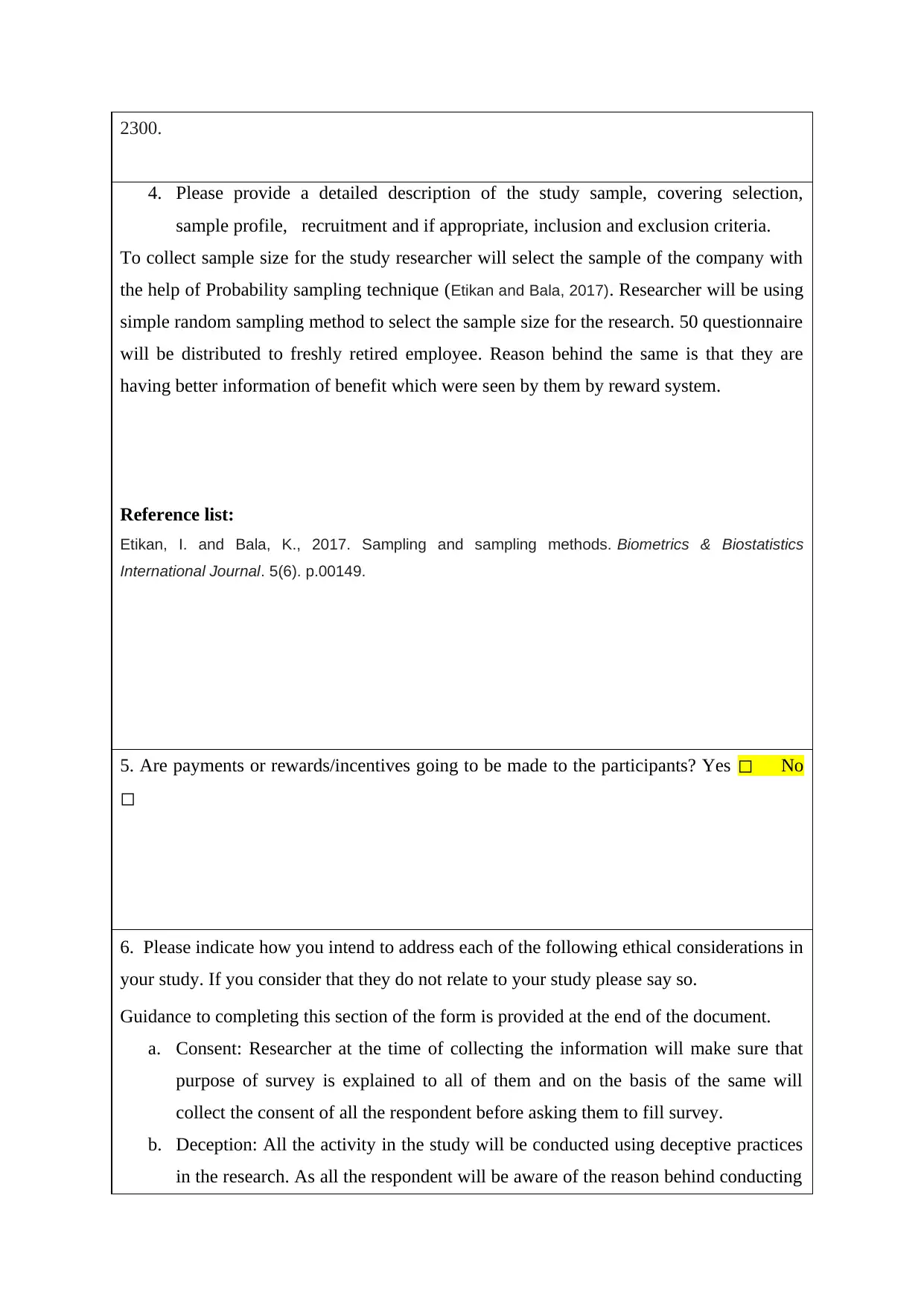
2300.
4. Please provide a detailed description of the study sample, covering selection,
sample profile, recruitment and if appropriate, inclusion and exclusion criteria.
To collect sample size for the study researcher will select the sample of the company with
the help of Probability sampling technique (Etikan and Bala, 2017). Researcher will be using
simple random sampling method to select the sample size for the research. 50 questionnaire
will be distributed to freshly retired employee. Reason behind the same is that they are
having better information of benefit which were seen by them by reward system.
Reference list:
Etikan, I. and Bala, K., 2017. Sampling and sampling methods. Biometrics & Biostatistics
International Journal. 5(6). p.00149.
5. Are payments or rewards/incentives going to be made to the participants? Yes ◻ No
◻
6. Please indicate how you intend to address each of the following ethical considerations in
your study. If you consider that they do not relate to your study please say so.
Guidance to completing this section of the form is provided at the end of the document.
a. Consent: Researcher at the time of collecting the information will make sure that
purpose of survey is explained to all of them and on the basis of the same will
collect the consent of all the respondent before asking them to fill survey.
b. Deception: All the activity in the study will be conducted using deceptive practices
in the research. As all the respondent will be aware of the reason behind conducting
4. Please provide a detailed description of the study sample, covering selection,
sample profile, recruitment and if appropriate, inclusion and exclusion criteria.
To collect sample size for the study researcher will select the sample of the company with
the help of Probability sampling technique (Etikan and Bala, 2017). Researcher will be using
simple random sampling method to select the sample size for the research. 50 questionnaire
will be distributed to freshly retired employee. Reason behind the same is that they are
having better information of benefit which were seen by them by reward system.
Reference list:
Etikan, I. and Bala, K., 2017. Sampling and sampling methods. Biometrics & Biostatistics
International Journal. 5(6). p.00149.
5. Are payments or rewards/incentives going to be made to the participants? Yes ◻ No
◻
6. Please indicate how you intend to address each of the following ethical considerations in
your study. If you consider that they do not relate to your study please say so.
Guidance to completing this section of the form is provided at the end of the document.
a. Consent: Researcher at the time of collecting the information will make sure that
purpose of survey is explained to all of them and on the basis of the same will
collect the consent of all the respondent before asking them to fill survey.
b. Deception: All the activity in the study will be conducted using deceptive practices
in the research. As all the respondent will be aware of the reason behind conducting
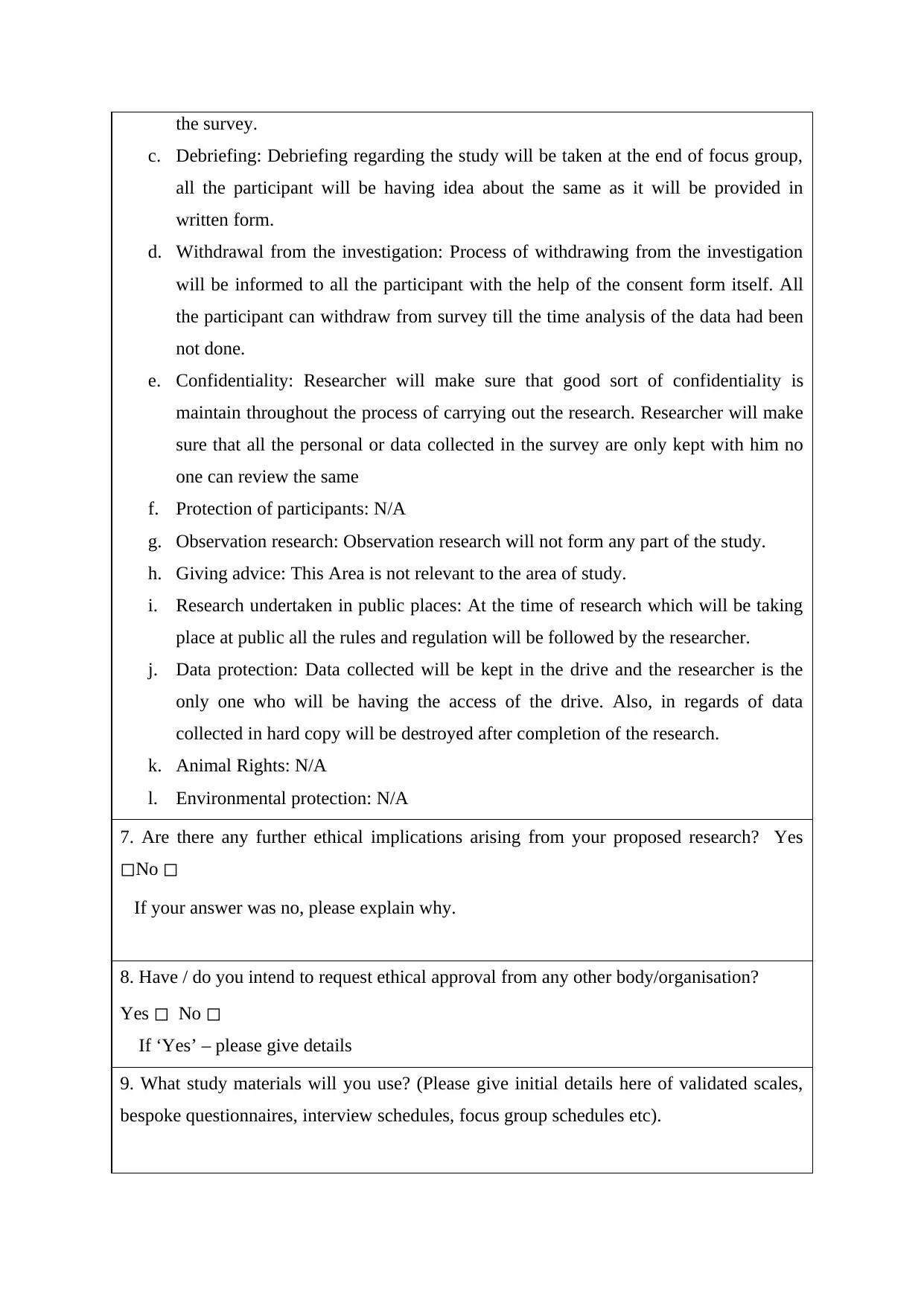
the survey.
c. Debriefing: Debriefing regarding the study will be taken at the end of focus group,
all the participant will be having idea about the same as it will be provided in
written form.
d. Withdrawal from the investigation: Process of withdrawing from the investigation
will be informed to all the participant with the help of the consent form itself. All
the participant can withdraw from survey till the time analysis of the data had been
not done.
e. Confidentiality: Researcher will make sure that good sort of confidentiality is
maintain throughout the process of carrying out the research. Researcher will make
sure that all the personal or data collected in the survey are only kept with him no
one can review the same
f. Protection of participants: N/A
g. Observation research: Observation research will not form any part of the study.
h. Giving advice: This Area is not relevant to the area of study.
i. Research undertaken in public places: At the time of research which will be taking
place at public all the rules and regulation will be followed by the researcher.
j. Data protection: Data collected will be kept in the drive and the researcher is the
only one who will be having the access of the drive. Also, in regards of data
collected in hard copy will be destroyed after completion of the research.
k. Animal Rights: N/A
l. Environmental protection: N/A
7. Are there any further ethical implications arising from your proposed research? Yes
◻No ◻
If your answer was no, please explain why.
8. Have / do you intend to request ethical approval from any other body/organisation?
Yes ◻ No ◻
If ‘Yes’ – please give details
9. What study materials will you use? (Please give initial details here of validated scales,
bespoke questionnaires, interview schedules, focus group schedules etc).
c. Debriefing: Debriefing regarding the study will be taken at the end of focus group,
all the participant will be having idea about the same as it will be provided in
written form.
d. Withdrawal from the investigation: Process of withdrawing from the investigation
will be informed to all the participant with the help of the consent form itself. All
the participant can withdraw from survey till the time analysis of the data had been
not done.
e. Confidentiality: Researcher will make sure that good sort of confidentiality is
maintain throughout the process of carrying out the research. Researcher will make
sure that all the personal or data collected in the survey are only kept with him no
one can review the same
f. Protection of participants: N/A
g. Observation research: Observation research will not form any part of the study.
h. Giving advice: This Area is not relevant to the area of study.
i. Research undertaken in public places: At the time of research which will be taking
place at public all the rules and regulation will be followed by the researcher.
j. Data protection: Data collected will be kept in the drive and the researcher is the
only one who will be having the access of the drive. Also, in regards of data
collected in hard copy will be destroyed after completion of the research.
k. Animal Rights: N/A
l. Environmental protection: N/A
7. Are there any further ethical implications arising from your proposed research? Yes
◻No ◻
If your answer was no, please explain why.
8. Have / do you intend to request ethical approval from any other body/organisation?
Yes ◻ No ◻
If ‘Yes’ – please give details
9. What study materials will you use? (Please give initial details here of validated scales,
bespoke questionnaires, interview schedules, focus group schedules etc).
⊘ This is a preview!⊘
Do you want full access?
Subscribe today to unlock all pages.

Trusted by 1+ million students worldwide

1 out of 7
Related Documents
Your All-in-One AI-Powered Toolkit for Academic Success.
+13062052269
info@desklib.com
Available 24*7 on WhatsApp / Email
![[object Object]](/_next/static/media/star-bottom.7253800d.svg)
Unlock your academic potential
Copyright © 2020–2026 A2Z Services. All Rights Reserved. Developed and managed by ZUCOL.




